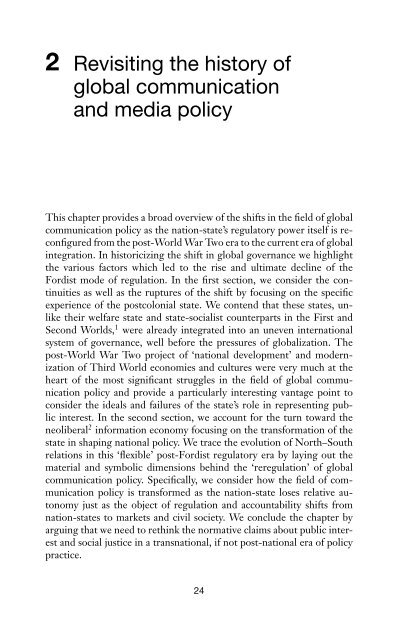Media Policy and Globalization - Blogs Unpad
Media Policy and Globalization - Blogs Unpad
Media Policy and Globalization - Blogs Unpad
Create successful ePaper yourself
Turn your PDF publications into a flip-book with our unique Google optimized e-Paper software.
2 Revisiting the history of<br />
global communication<br />
<strong>and</strong> media policy<br />
This chapter provides a broad overview of the shifts in the field of global<br />
communication policy as the nation-state’s regulatory power itself is reconfigured<br />
from the post-World War Two era to the current era of global<br />
integration. In historicizing the shift in global governance we highlight<br />
the various factors which led to the rise <strong>and</strong> ultimate decline of the<br />
Fordist mode of regulation. In the first section, we consider the continuities<br />
as well as the ruptures of the shift by focusing on the specific<br />
experience of the postcolonial state. We contend that these states, unlike<br />
their welfare state <strong>and</strong> state-socialist counterparts in the First <strong>and</strong><br />
Second Worlds, 1 were already integrated into an uneven international<br />
system of governance, well before the pressures of globalization. The<br />
post-World War Two project of ‘national development’ <strong>and</strong> modernization<br />
of Third World economies <strong>and</strong> cultures were very much at the<br />
heart of the most significant struggles in the field of global communication<br />
policy <strong>and</strong> provide a particularly interesting vantage point to<br />
consider the ideals <strong>and</strong> failures of the state’s role in representing public<br />
interest. In the second section, we account for the turn toward the<br />
neoliberal 2 information economy focusing on the transformation of the<br />
state in shaping national policy. We trace the evolution of North–South<br />
relations in this ‘flexible’ post-Fordist regulatory era by laying out the<br />
material <strong>and</strong> symbolic dimensions behind the ‘reregulation’ of global<br />
communication policy. Specifically, we consider how the field of communication<br />
policy is transformed as the nation-state loses relative autonomy<br />
just as the object of regulation <strong>and</strong> accountability shifts from<br />
nation-states to markets <strong>and</strong> civil society. We conclude the chapter by<br />
arguing that we need to rethink the normative claims about public interest<br />
<strong>and</strong> social justice in a transnational, if not post-national era of policy<br />
practice.<br />
24

















